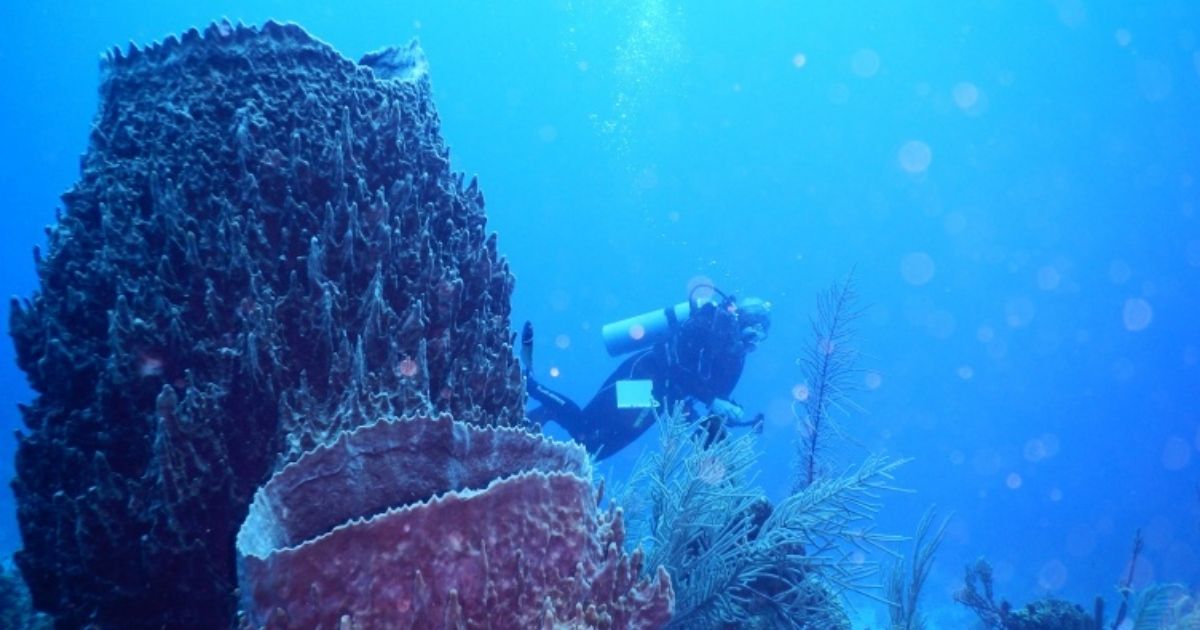Sponges in coral reefs, less flashy than their coral neighbors but important to the overall health of reefs, are among the earliest animals on the planet.
New research from the University of New Hampshire examines coral reef ecosystems with a novel approach to understanding the complex evolution of sponges and the microbes that live in symbiosis with them. With this "genomic time machine," researchers can predict aspects of reef and ocean ecosystems through hundreds of millions of years of dramatic evolutionary change.
"This work shows how microbiomes have evolved in a group of organisms over 700 million years old," said Sabrina Pankey, a postdoctoral researcher and lead author of the study. "Sponges are increasing in abundance on reefs in response to climate change and they play an enormous role in water quality and nutrient fixation."
In the study, recently published in the journal Nature Ecology & Evolution, the significance of the work transcends sponges, providing a new approach to understanding the past based on genomics. The researchers characterized almost 100 sponge species from across the Caribbean using a machine-learning method to model the identity and abundance of every member of the sponges' unique microbiomes, the community of microbes and bacteria that live within them in symbiosis. They found two distinct microbiome compositions that led to different strategies sponges used for feeding (sponges capture nutrients by pumping water through their bodies) and protecting themselves against predators -- even among species that grew side by side on a reef.
"If we can reconstruct the evolutionary history of complex microbial communities like this, we can say a lot about the Earth's past," said David Plachetzki, associate professor of molecular, cellular and biomedical sciences and study co-author. "Research like this could reveal aspects of the chemical composition of the Earth's oceans going back to before modern coral reefs even existed, or it could provide insights on the tumult that marine ecosystems experienced in the aftermath of the greatest extinction in history that took place about 252 million years ago."
The types of symbiotic communities the researchers describe in this paper are very complex, yet they can show they evolved independently multiple times. They say that there is something very specific about what these microbial communities are doing. Sponges dozens of times have decided that this diverse arrangement of microbes works for them.
Leveraging this new genomic approach, the researchers found that the origin of one of these distinct microbiomes, which had a high microbial abundance (HMA) of more than a billion microbes per gram of tissue, occurred at a time when the Earth's oceans underwent a significant change in biogeochemistry coincident with the origins of modern coral reefs.
The project was funded by National Science Foundation Dimensions of Biodiversity and Biological Oceanography Program.
The University of New Hampshire inspires innovation and transforms lives in our state, nation and world. More than 16,000 students from all 50 states and 71 countries engage with an award-winning faculty in top-ranked programs in business, engineering, law, health and human services, liberal arts and the sciences across more than 200 programs of study. A Carnegie Classification R1 institution, UNH partners with NASA, NOAA, NSF and NIH, and received $260 million in competitive external funding in FY21 to further explore and define the frontiers of land, sea and space.



